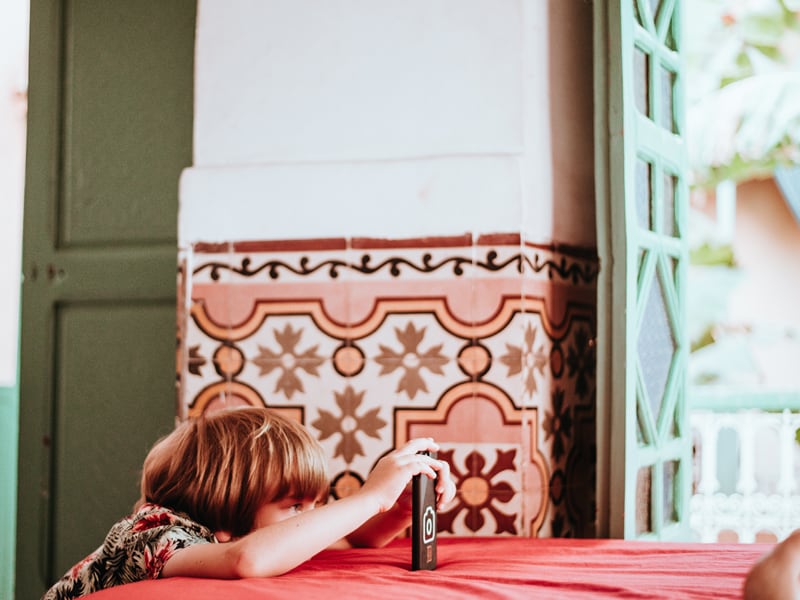There is no such thing as stress-free parenting. Peaceful parenting isn’t a place with no stress, but a place where you take the stress as it comes, in stride, and don’t let it rule you. You let it flow through you, and then smile, and breathe, and give your child a hug.
Parents will always have stress: we not only have to deal with tantrums and homework and refusing to eat anything you cook, but we worry about potential accidents, whether we are ruining our kids, whether our children will find happiness as adults and be able to provide for themselves and find love.
That said, I’ve learned that we can find peace.
Related: The end of the angry mum
There is a Way of Peaceful Parenting, but it isn’t one that I’ve learned completely. I’ll share what I’ve learned so far, with the caveat that I don’t always follow the Way, that I still make mistakes daily, that I still have a lot to learn, that I don’t claim to have all the answers as a parent.
The Way of Peaceful Parenting
The Way of Peaceful Parenting is only learned by walking it. Here are the steps I recommend:
Greet your child each morning with a smile, a hug, a loving Good Morning! This is how we would all like to be greeted each day.
Teach your child to make their own breakfast, get ready for school and be independent in the mornings.
Teaching these skills takes patience. Kids suck at them at first, so you have to show them about a hundred times, but let them try it, correct them, and let them make mistakes. They will gradually learn independence and you will gradually have less work to do caring for them.
Older children helping younger children
Older children can help younger children — it’s good for them to learn responsibility, it helps the younger children learn from the older ones, and it takes some of the stress off you.
Read to and with them often. It’s a wonderful way to bond, to educate, to explore imaginary worlds.
More on this: How to keep older kids reading
When your child asks for your attention, grant it.
Parents need alone time, though. Set certain traditions so that you’ll have time to work on your own, or have time with your partner in the evening, when your child can do things on their own.
When your child is upset, put yourself in their shoes. Don’t just judge the behavior (yes, carrying on and screaming isn’t ideal), but the needs behind the behaviour. Do they need a hug, or attention, or maybe they are just tired?
Model the behaviour you want your child to learn. Don’t yell at the child because they lost it. Don’t get angry at a child for losing their temper. Don’t get mad at a kid who wants to play video games all the time if you’re always on your laptop. Be calm, smile, be kind, go outdoors and be active.
Find the humour
When a stressful time arises (and it will), learn to deal with it with a smile. Make a joke, turn it into a game, laugh … you’ll teach your child not to take things so seriously, and that life is to be enjoyed. Breathe, walk away if you’ve lost your temper, and come back when you can smile.
When your child asks for your attention, grant it.
Let your child share your interests. Bake together. Sew together. Exercise together. Read together. Work on a website together. Write a blog together.
Know that when you screw up as a parent, everything will be fine. Forgive yourself. Apologise. Learn from that screw up. In other words, model the behaviour you’d like your child to learn whenever they screw up.
Boundaries are key
Patiently teach your child the boundaries of behaviour. There should be boundaries — what’s acceptable and what’s not. It’s not okay to do things that might harm yourself or others. We should treat each other with kindness and respect. Those aren’t things a child learns immediately, so have patience, but set the boundaries. Within those boundaries, allow lots of freedom.
Give your child some space. Parents too often over-schedule their child’s life, with classes and sports and music and clubs and the like, but it’s a constant source of stress for both child and parent to keep this schedule going. Let the child learn to hang out and make their own fun. Free time is necessary. You don’t always have to be by their side either — they need alone time just as much as you do.

Exercise to cope with stress. A run in solitude is a lovely thing. Get a massage now and then.
Be a peaceful parenting team
It helps tremendously to be a parenting team — one parent can take over when the other gets stressed. When one parent starts to lose his temper, the other should be a calming force.
Sing and dance together.
Take every opportunity to teach kindness and love. It’s the best lesson.
Kiss your child goodnight, no matter their age. And give thanks for another amazing day with your beautiful, unique, crazy child.
What does peaceful parenting mean to you?
Feature image by Gregory Hayes; Screen by Annie Spratt

